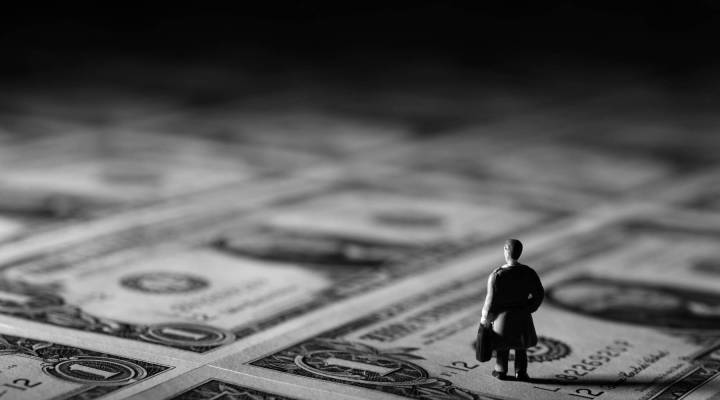
‘Riskalyze’ before you invest
Share Now on:
‘Riskalyze’ before you invest

Tess Vigeland: So here’s a word familiar to you, dear listener: Risk. Risk tolerance, to be specific. As in, to figure out how much money you should have in stocks, you gotta figure out what your risk tolerance is. How much you could lose on paper before you lose your lunch. But how do you know what that number is?
Aaron Klein wants to help you figure it out. He’s the CEO of a new company called Riskalyze. Aaron, welcome to the show.
Aaron Klein: Thank you, thanks for having us.
Vigeland: So, tell us how Riskalyze works.
Klein: Sure, well investing is broken. I think most people would agree with that. There’s just way too much emotion and conflict in our investing decisions. And while technology has transformed so much of our world, we really haven’t changed how we make investing decisions at all. The missing puzzle piece is our personal and unique tolerance for risk, because it’s subjective and it lives in our head and our gut. And so the technology we’ve invented transforms your subjective risk tolerance into a quantitative, mathematical function that can lead you to the investment decisions that fit you.
Vigeland: Well, you know, risk is something that we talk about all the time on the program and the mantra is, “Figure out what your risk tolerance is.” And as you say, it’s such a personal thing that I find it hard to imagine how technology could figure that out for you.
Klein: Sure. Well, you know, rather than ask you 50 questions about your income, your age, your kids, we ask you to make 12 simple investing decisions using an amount of money that’s meaningful to you. You’re teaching our algorithms when you’re going to trade certainty for risk.
Vigeland: But how do you even know how to answer that very first question, which is “How much money are you willing to lose?” If you ask me that, I would have no idea how much I’m willing to lose, because I’m willing to lose different amounts at different times, I would think.
Klein: Great question. And I would say two things to that: First of all, you’re absolutely right. It’s critical that we have to really consider the impact of our choices and how losing and gaining those amounts of money will affect our life. So it’s a pretty important 12 questions. You’re not gonna want to take those lightly; you’re gonna think about it and say, “If I lost this amount of money or if I gain this amount of money, what does that mean that I can or can’t do about retirement, about sending my kid to college about buying a house?” — whatever those things are in your future. And so if you don’t answer those accurately, you’re correct that that’s not gonna work.
But I will also say that it does change over time, and so events in the market are gonna change, not just our portfolio, but it’s also gonna change our tolerance for risk. And so, your risk fingerprint changes on a regular basis. Our recommendation to our users is that they update their risk fingerprint at least every two months. And then see if the changes are significant enough that they should consider rebalancing their portfolio.
Vigeland: Why do you think it’s so hard for us to understand our own risk tolerance?
Klein: I think that’s a great question. Part of it is that it’s a very emotional topic, right? There’s very few topics that can match the emotion level that comes with money. I think to some extent, we know it better than we realize. Because if we start having to sit down and make a decision, if I came to you and said, “Tess, here’s an investment and here are the probabilities of success and the probabilities of failure. And so you’ve got a 52 percent chance of making this much money and a 48 percent chance of losing this much money.” You’d be able to just look at that decision and say, “No, this is not for me. THere’s too big of a downside here.” And I might look at the same decision and say, “This is the right decision for me. That works for me.” And so we know our tolerance first, but we don’t know how to quantify it and we don’t know how to apply it.
Vigeland: And I think sometimes we look at those percentages and we’re like, “Wait a minute, you want me to do math?”
Klein: Exactly. Help me translate this to an outcome in my life. Money is not the end, is it? Money is a means to an end. Our families, our lives, our careers. These are all the things we do in life that have meaning more than just money. And so, you definitely have to connect that to what the consequences are of a change in your financial net worth.
Vigeland: Aaron Klein is the CEO of Riskalyze.com. Aaron, thank you so much for coming in.
Klein: Thank you Tess.
There’s a lot happening in the world. Through it all, Marketplace is here for you.
You rely on Marketplace to break down the world’s events and tell you how it affects you in a fact-based, approachable way. We rely on your financial support to keep making that possible.
Your donation today powers the independent journalism that you rely on. For just $5/month, you can help sustain Marketplace so we can keep reporting on the things that matter to you.


















